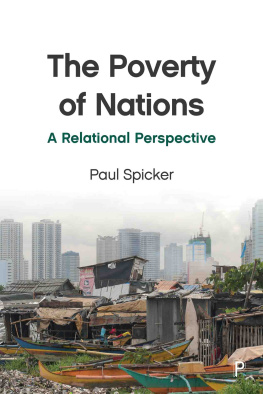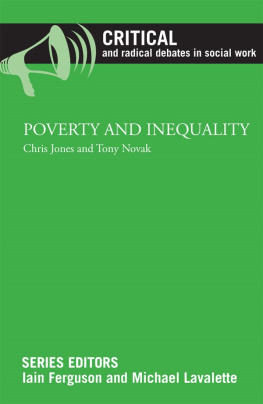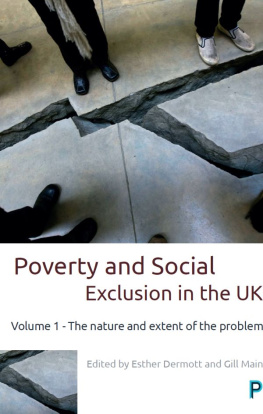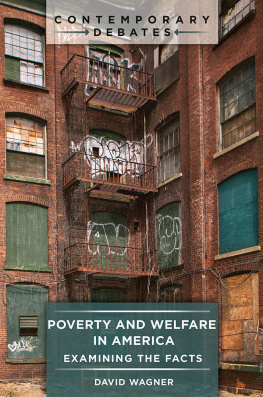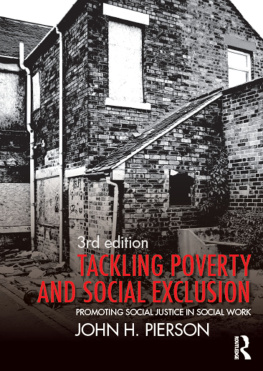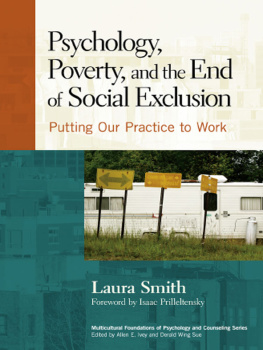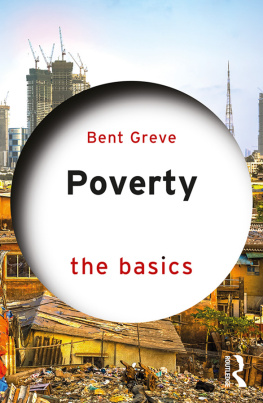First published in Great Britain in 2020 by
Policy Press
University of Bristol
19 Old Park Hill
Bristol
BS2 8BB
UK
t: +44 (0)117 954 5940
pp-info@bristol.ac.uk
www.policypress.co.uk
Policy Press 2020
British Library Cataloguing in Publication Data
A catalogue record for this book is available from the British Library
ISBN 978-1-4473-5490-1 (paperback)
ISBN 978-1-4473-5489-5 (hardcover)
ISBN 978-1-4473-5493-2 (ePub)
ISBN 978-1-4473-5492-5 (ePdf)
The right of Michal Krumer-Nevo to be identified as author of this work has been asserted by her in accordance with the Copyright, Designs and Patents Act 1988.
All rights reserved: no part of this publication may be reproduced, stored in a retrieval system, or transmitted in any form or by any means, electronic, mechanical, photocopying, recording, or otherwise without the prior permission of Policy Press.
The statements and opinions contained within this publication are solely those of the author and not of the University of Bristol or Policy Press. The University of Bristol and Policy Press disclaim responsibility for any injury to persons or property resulting from any material published in this publication.
Policy Press works to counter discrimination on grounds of gender, race, disability, age and sexuality.
Cover design by Robin Hawes
Front cover image: Viki Itzhaki, vikistudio.com
Printed and bound in Great Britain by CMP, Poole
Policy Press uses environmentally responsible print partners
The list of people who accompanied me during the development of the Poverty-Aware Paradigm (PAP) is too long to include here. It includes service users, activists, social workers, policymakers, students, colleagues and members of human rights organisations. I am deeply grateful to all of you. In particular, I thank the social work students and supervisors who participated in the programme Casework for Social Change and the social workers who participated in the PAP courses initiated by the Ministry of Welfare and Social Services for sharing with me so many anecdotes from their practices, many of which found their way into this book. Thank you for teaching me and learning with me.
The Ministry of Welfare and Social Services, with the collaboration of the National Insurance Institute, JDC-Ashalim and the Rashi Foundation, led the development of the PAP programmes and the implementation of the PAP in social services departments on a national scale from 2014. Part of this process consisted of implementing a project aimed at developing digital materials on the PAP. , In the face of social injustice a panel. I also thank Semadar and Nurit (pseudonyms) who gave me permission to publish their stories of practice. Finally, I thank Lindsay Talmud for his careful editing and Nur Shimei, Yuval Saar-Heiman, Shachar Timor-Shlevin, Eynat Vager-Atias and Sivan Russo-Carmel for their ongoing comradeship. I appreciate it very much.
The coronavirus burst into our lives as this book was in the final stages of proofreading. It is impossible to evaluate, at the present stage, what the long-term effects of coronavirus on our lives will be. What is clear is that this medical crisis carries heavy social and economic costs. The crisis exposed the ailments of neoliberal policy which, in recent years, changed the structure of the employment market and gnawed at the health, welfare and education systems. It seems that the pandemic exposes the deficiencies of the economic right, and the weakness of the ideas of personal responsibility and extreme individualism. Suddenly it is clear to everyone that the state has a crucial role as a safety net for its citizens, and that solidarity and mutual responsibility are the order of the day.
Coping with the pandemic has raised the question whether Western states can allow themselves to continue weakening the public systems, cutting the social safety net and abandoning citizens each to her own lot or will be able to show responsibility towards the citizens, to safeguard their physical and economic security and to build social institutions based on the principles of equality and social justice. This debate is important and precious. It constitutes an opportunity for social work academics and practitioners alike to take part and make a stance. It reminds us of the social basis of the discipline and strengthens the radical and critical ideas informing it from its inception.
Nonetheless, a poverty-aware stance compels us at all times to examine specifically the implications of the new situation on the weakened and excluded group of people living in poverty. Without ignoring the situation of millions of people around the world who experience firsthand a lack of economic security, it is important to remember and remind others of the material and symbolic implications of the situation on those who live in poverty and experience economic hardship for a long time. A poverty-aware stance in times of lockdown means a specific consideration of the implications of the crisis on those who live in small flats with no yard or porch to offer some refuge from overcrowdedness and physical and emotional suffocation, those who are not eligible for allowances in the form of unemployment benefits, those who do not have health insurance, those who do not have an internet connection in their house (vital for connecting with other people), and those who do not have a computer for every child in their house and cannot make use of the services of online teaching. An awareness of poverty enables us to remember that the lockdown has brought about an abrupt job termination for all those who worked in undeclared work, that is, all those who managed to work in temporary, unstable jobs, and who are not entitled, in the wake of the lockdown, to compensation for losing their income.
Not less important is examining critically the processes of decision-making taking place vis-a-vis the crisis and the policy measures that are being decided upon. Such an examination will enable us to discern the lack of representation of the interests of people in poverty in the decision-making processes. In Israel, the decision on the lockdown and the dialing down of the economic activity to the bare minimum as a coping mechanism with the pandemic has rapidly brought about massive lobbying action on the part of various elements in the organised work sector. But the sector of workers at the bottom of the employment market did not get representation. In this way, policy resolutions can be reached that ignore the interests of those who live for many years on minimal wages. In the same vein, the interests of those who do not work but live on benefits alone did not get meaningful representation. Policy-makers do not recognise the implications of the pandemic on the most weakened and excluded groups, be it workers, non-workers, people without status, refugees, and, given the lack of political power, the voice of these groups is shoved to the side in the hectic public debate developing these days.
In this hour, we do not know what will happen the following day. Will the pandemic constitute a turning point in the ongoing history of neoliberal ideology? Will we see a return to a social-democratic policy on the model of a developed welfare state that does not shirk its responsibility of providing social services? Will we see a change in interpersonal discourse and practice in the direction of strengthening democracy and social solidarity? Or will the social crisis only toughen individualistic and conservative positions, divisiveness and exclusion? What is certain is that in this hour the voice of poverty-aware social workers is a necessary, crucially important one.


